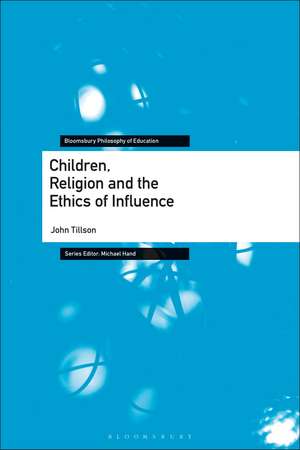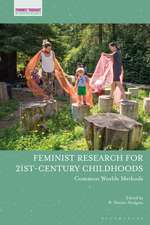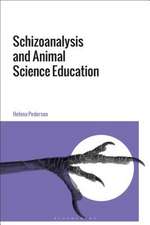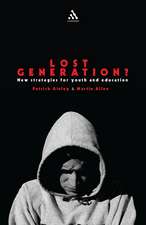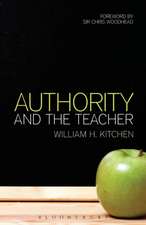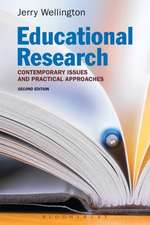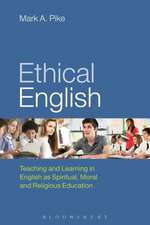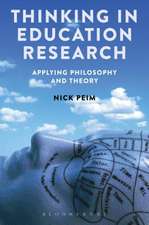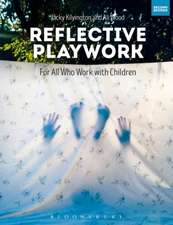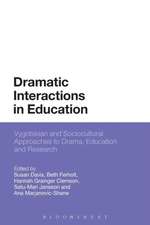Children, Religion and the Ethics of Influence: Bloomsbury Philosophy of Education
Autor John Tillsonen Limba Engleză Hardback – 12 iun 2019
| Toate formatele și edițiile | Preț | Express |
|---|---|---|
| Paperback (1) | 216.70 lei 6-8 săpt. | |
| Bloomsbury Publishing – 23 dec 2020 | 216.70 lei 6-8 săpt. | |
| Hardback (1) | 714.12 lei 6-8 săpt. | |
| Bloomsbury Publishing – 12 iun 2019 | 714.12 lei 6-8 săpt. |
Preț: 714.12 lei
Preț vechi: 1027.41 lei
-30% Nou
Puncte Express: 1071
Preț estimativ în valută:
136.66€ • 141.81$ • 114.23£
136.66€ • 141.81$ • 114.23£
Carte tipărită la comandă
Livrare economică 18 martie-01 aprilie
Preluare comenzi: 021 569.72.76
Specificații
ISBN-13: 9781350066793
ISBN-10: 1350066796
Pagini: 208
Dimensiuni: 156 x 234 mm
Greutate: 0.45 kg
Editura: Bloomsbury Publishing
Colecția Bloomsbury Academic
Seria Bloomsbury Philosophy of Education
Locul publicării:London, United Kingdom
ISBN-10: 1350066796
Pagini: 208
Dimensiuni: 156 x 234 mm
Greutate: 0.45 kg
Editura: Bloomsbury Publishing
Colecția Bloomsbury Academic
Seria Bloomsbury Philosophy of Education
Locul publicării:London, United Kingdom
Caracteristici
Answers key questions such as: how we come to have the ethical responsibilities we do, how we understand religion, and what makes children ethically special
Notă biografică
John Tillson is Lecturer in Philosophy of Education at Liverpool Hope University, UK.
Cuprins
1. Introduction2. The Sources of Parental and Extra-Parental Responsibility3. The Content of Parental and Extra-Parental Responsibility4. Those Respects in which People Can Be Formatively Influenced5. What Forms Can and Should Influence Take?6. A Theory of Ethical Influence7. The Nature of Religion8. The Status of Religion9. How Children Ought to Be Formatively Influenced, with Respect to Religion(S)ReferencesIndex
Recenzii
I appreciate the emphasis on influence here as it so directly raises the question of the ethics of justification. In this sense, I find Tillson's approach extremely engaging ... [The book] provides a vital discussion of questions of influence and its justification.
An almost universal assumption is that forming children's religious identity is something that adults permissibly do as parents, religious teachers, or the like. John Tillson argues with great force and ingenuity that this is simply a huge moral mistake. Tillson's prose is a model of clarity, and though there is much here to interest scholars in the area of children's rights, the book is accessible to anyone who cares about the questions it raises and is ready to consider the subversive answers it gives. This is a brilliant and provocative book.
A detailed, closely argued, and richly resourced contribution to the philosophy of education. Tillson provides a carefully constructed, comprehensive, and analytically rigorous rebuttal of the view that it is morally permissible to attempt to instil religious beliefs in children. This is a work that is stacked full of interesting and controversial arguments, from questions about well-being and the moral responsibilities of parents, to arguments for and against the existence of a deity. The upshot is an exciting and ingenious intervention into the live moral and political debate surrounding the appropriate role of parents, teachers, and other educators with regard to religious belief and worries about indoctrination.
The belief that parents have a right to raise their children within a religious tradition - be it in school or outside - is widely assumed to be correct. But is it? John Tillson presents a careful, well-crafted case for a conclusion many will find a shocking. Tillson has the virtue of writing in an engaging, accessible way. This is a valuable contribution to an important debate. It is a book that nicely illustrates how analytic philosophy can both effectively challenge received wisdom and generate conclusions that have significant, real-life consequences.
An almost universal assumption is that forming children's religious identity is something that adults permissibly do as parents, religious teachers, or the like. John Tillson argues with great force and ingenuity that this is simply a huge moral mistake. Tillson's prose is a model of clarity, and though there is much here to interest scholars in the area of children's rights, the book is accessible to anyone who cares about the questions it raises and is ready to consider the subversive answers it gives. This is a brilliant and provocative book.
A detailed, closely argued, and richly resourced contribution to the philosophy of education. Tillson provides a carefully constructed, comprehensive, and analytically rigorous rebuttal of the view that it is morally permissible to attempt to instil religious beliefs in children. This is a work that is stacked full of interesting and controversial arguments, from questions about well-being and the moral responsibilities of parents, to arguments for and against the existence of a deity. The upshot is an exciting and ingenious intervention into the live moral and political debate surrounding the appropriate role of parents, teachers, and other educators with regard to religious belief and worries about indoctrination.
The belief that parents have a right to raise their children within a religious tradition - be it in school or outside - is widely assumed to be correct. But is it? John Tillson presents a careful, well-crafted case for a conclusion many will find a shocking. Tillson has the virtue of writing in an engaging, accessible way. This is a valuable contribution to an important debate. It is a book that nicely illustrates how analytic philosophy can both effectively challenge received wisdom and generate conclusions that have significant, real-life consequences.
